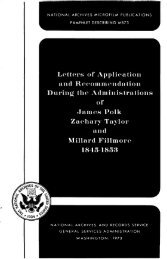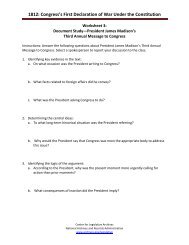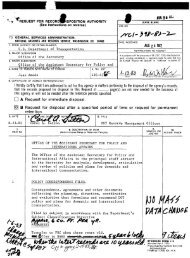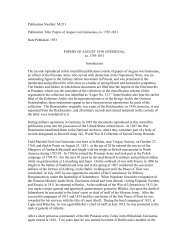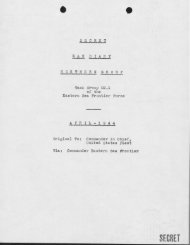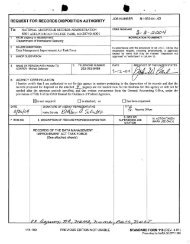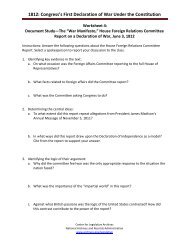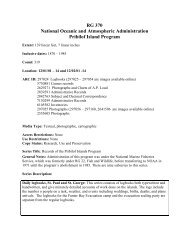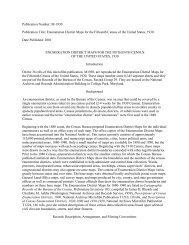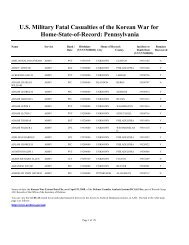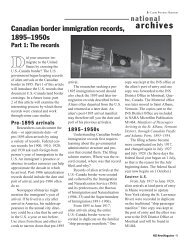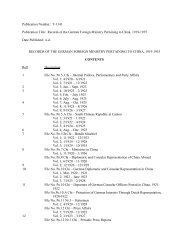HITLER'S SHADOW - National Archives and Records Administration
HITLER'S SHADOW - National Archives and Records Administration
HITLER'S SHADOW - National Archives and Records Administration
You also want an ePaper? Increase the reach of your titles
YUMPU automatically turns print PDFs into web optimized ePapers that Google loves.
defense against Bolshevism.” 25 Franke-Gricksch also cultivated contacts in the<br />
East Germany. These included secret Bruderschaft members with whom Franke-<br />
Gricksch maintained courier nets. They also included members of the Socialist<br />
Unity Party <strong>and</strong> the Soviet Military <strong>Administration</strong>. Franke-Gricksch hoped that<br />
Moscow’s various statements on German unity in return for “peace”––whatever<br />
this might mean to the Soviets––might be used to good effect. 26<br />
In August 1950 Karl Kaufmann talked of “primarily siding with the Russians,<br />
<strong>and</strong> later turning against them in order to reestablish the old Germany.” 27 In March<br />
1951, Franke-Gricksch argued that “Germany should pretend to collaborate with<br />
the East until certain concessions are granted by the West, then shift toward<br />
the West to gain concessions from the East.” 28 In November 1950, he told the<br />
Americans through Günther d’Alquen (the former editor of the SS magazine Das<br />
Schwarze Korps) that “the Americans sooner or later will be compelled to turn to<br />
the Bruderschaft for assistance….” 29 In fact, Franke-Gricksch’s relationships in East<br />
Germany opened the Bruderschaft up to penetration by communist agents. 30<br />
What could be done about the Bruderschaft? Adenauer’s top military advisers,<br />
Gen. Adolf Heusinger <strong>and</strong> Gen. Hans Speidel, viewed the Bruderschaft as “young,<br />
overambitious, ex-officers” who comprised a “radical right wing group” with a<br />
“liberal sprinkling of SS elements” who “became bitter over their fate after the<br />
war <strong>and</strong> decided that their life under Hitler wasn’t so bad after all.” According to<br />
the British, Manteuffel <strong>and</strong> other senior army officers in the Bruderschaft were<br />
mostly interested in restoring the Wehrmacht’s good name <strong>and</strong> were “horrified<br />
by the public exposure of their names as leaders of an underground movement<br />
in association with those of ex-Gauleiters <strong>and</strong> SS leaders.” Equally uncomfortable<br />
with Franke-Gricksch’s Communist ties, they hoped to reorganize the Bruderschaft<br />
along more conservative lines in 1950. Heusinger <strong>and</strong> Speidel argued that state<br />
pensions for officers <strong>and</strong> the release of Army personnel from war crimes enclosures<br />
would satisfy ex-officers <strong>and</strong> help the Bruderschaft to “die a natural death.” 31<br />
In fact, the Bruderschaft died even before such developments owing to splits<br />
between Franke-Gricksch <strong>and</strong> Beck-Broichsitter. Disagreements over strategy<br />
were decisive. By 1951 Beck-Broichsitter <strong>and</strong> the military clique, though still<br />
hoping for military independence, advocated cooperation with the United States<br />
<strong>and</strong> rejected connections with the USSR. Franke-Griksch’s backers believed a<br />
pro-Soviet policy offered the best chance for German unity <strong>and</strong> that “One cannot<br />
58 | The CIC <strong>and</strong> Right-Wing Shadow Politics



